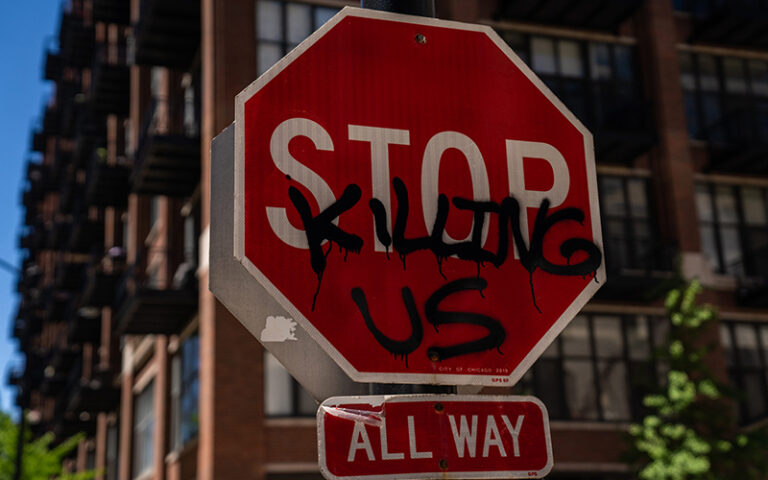For too long, Black people have been murdered because the color of their skin is offensive to someone with a weapon and the mindset to use it. No person in this nation — which is quick to celebrate her ideal that all people are created equal and have fundamental rights of liberty, free speech, freedom of religion, due process of law, and freedom of assembly — should exist in fear for their lives, or should question whether those rights apply. Yet, here we are, nearly 250 years after this nation was founded, asking that question.
Stop killing us.
I’m a Black woman. When a white man murders people who look like me in a grocery store in broad daylight just because they’re Black, he sends a clear message that he doesn’t think people like me deserve to live. Which political party espouses that view? How many times will mental health or gun laws be blamed as the problem instead of a laser-like focus on white dominance over everyone else? Which group holds up the banner that reads, “America is for white people — only” and ignores, no, wait — murders — the identities of those who look, learn, and love differently?
Stop killing us.
I ask because as I read the reactions to the murders, I see a lot of statements about what media figure, political party, or ideology is responsible. I don’t understand that. What the murderer told us — in his own words — is that white supremacy is responsible. So, we can sit here and wring our hands, express our outrage, tweetstorm. Or, we can do something.
Stop killing us.
No one hurries to claim white supremacy publicly; white folks like to say it exists at the fringes of our society. The “fringes” implies borders, peripheries, outer limits. But a recent poll, conducted by the Associated Press-NORC Center for Public Affairs Research, found that one in three American adults now believes in a version of replacement theory, a conspiracy theory that states that nonwhite individuals are being brought into the United States and other Western countries to “replace” white voters to achieve a political agenda. If one third of Americans believe in it, then the “fringes” have moved to the center — our politicians, our policies, our law enforcement, our schools. The Buffalo murderer ascribed to this theory, which is inseparable from white supremacy.
Stop killing us.
So, white supremacy is moving beyond the “fringes.” And you know what emboldens it? Silence. In an essay James Baldwin wrote in 1980, aptly called Dark Days, he says, “To be white was to be forced to digest a delusion called white supremacy.”* How many white people are rejecting that delusion today and how are we to know, particularly in response to these murders? I want to hear white people screaming from the rooftops that they reject, will act against, and will teach their children to denounce white supremacy in their words and actions. I want to spread the outrage and consternation and wails that are undoubtedly filling the homes of the ten Black souls whose lights were snuffed out over the weekend — while they were buying food for themselves and their families.
Stop killing us.
I look forward to rejoicing in, and joining the civil rights movement that white people will start to act against white supremacy. I look forward to supporting teachers, coaches, and school leaders to teach about this movement (and its predecessors that made it possible) in schools. I look forward to helping my children see the day when white supremacy is acted against so forcefully by white people that it is pushed further away than the fringes. Because, maybe then, people who hate the color of our skin will…
Stop killing us.
by Nataki Gregory, Ed.D. Chief Executive Officer of CT3
*Incidentally, in that same essay, Baldwin laments the acquittal of four Miami policemen who beat a Black man to death. The acquittal made page 24 of the New York Times. The uprising resulting from the acquittal made page one.
REFERENCES
- Baldwin, J. (1984). Dark Days. In Baldwin: Collected Essays (pp. 788–798). essay, Penguin Books.
- Yousef, O. (2022, May 17). What is the “great replacement” and how is it tied to the Buffalo shooting suspect? Npr.org. Retrieved May 17, 2022, from https://www.npr.org/2022/05/17/1099233034/the-great-replacement-conspiracy-theory-isnt-fringe-anymore-its-mainstream.
Check out CT3 Education programs such as No-Nonsense Nurturer, Real Time Teacher Coaching, and Real Time Leadership Coaching to find out more about Professional Development for Teachers and Leaders, classroom management strategies, and building relationships with students and their families, and properly addressing important issues in the classroom and school.
Category: Anti-Racism


